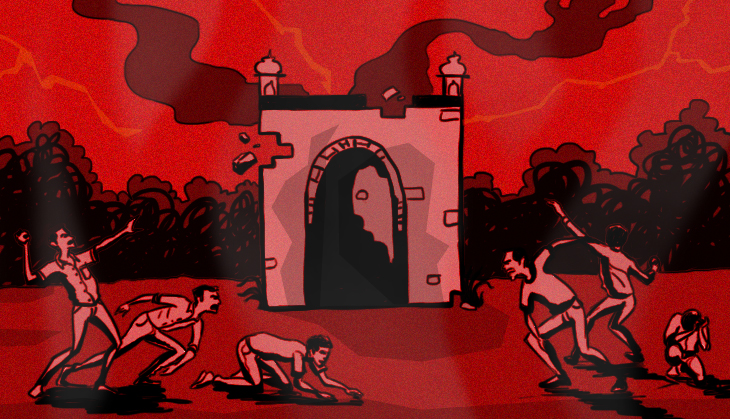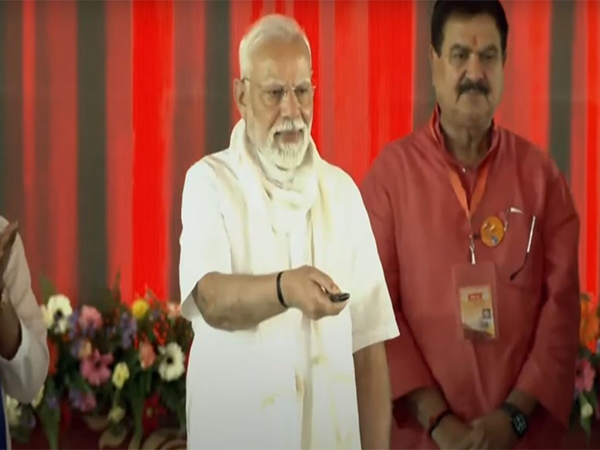Deadly concoction: the politics, economics & myths behind #ManipurRiots

At least 33 people have been injured, eight houses burnt and a mosque damaged in communal violence that broke out in Manipur on 11 April.
What sparked the violence?
Of late, Manipur has witnessed an alarming rise in assaults on Muslims. On 25 March, six Muslim schoolchildren were attacked while on their way to a Holi dance programme. So brutally were they beaten that three of them had to be rushed to Guwahati for treatment.
Although an FIR was registered immediately, the police failed to arrest any of the attackers.
Also read -
Smoke signals: how to read the BJP win in Manipur. And why it matters
On 7 April, two Muslim boys were lynched by a Hindu mob at Sangaisabi Fish Farm in Mayang Imphal, 28 km from the capital Imphal, for allegedly trying to steal a motorcycle.
To protest the killings, a Joint Action Committee of Muslim groups called a shutdown Monday. The strike was opposed by the Meitei community, which is mostly Hindu.
On Monday, supporters of the strike allegedly damaged a passenger bus and tried to burn private vehicles. Clashes ensued.
As violence spread, members of both communities fired licensed guns, causing pellet injuries to at least 33 people.
The district administration rushed additional police personnel and imposed curfew in Konchak and Bengoon areas of Mayang Imphal to curb the riots. The "situation is under control" now, according to the police, but "tension prevails between the two communities".
The state's police chief LM Khaute also said "mediation work is underway through community leaders of both the Meiteis and the Muslims". "As of now, the priority is to make the area 'no weapon zone' by asking the licensed gun holders to deposit their firearms. If this method does not yield the desired result, police personnel will make home visits and collect them. Besides this, the police is initiating conflict resolution through community dialogues."
Why did the state fail to prevent it?
"The police's failure to take prompt action is solely responsible for the riots. As chairperson of the Manipur State Minorities Commission, I had written to the DGP to take prompt action against those involved in the 7 April lynching as well as in the other incident where six Muslim boys were assaulted during Holi celebrations. But despite my repeated reminders to the DGP, no action was taken and no arrests made," said Syed Burhanuddin. "This indifferent attitude prompted the Joint Action Committees to call the shutdown strike Monday."
DGP Khaute, however, rejected the allegation of not taking prompt action, saying the "violence broke out even as investigations were on". He asserted that "for proper investigation, particularly of cases of such communal nature and mob incidents, tactful handling is crucial and requires more time."
Syed Ahmed, Secretary General of the influential All Manipur Muslim Meitei Pangal Welfare Association, said, "That incidents of mob justice are on the rise in Manipur is a clear indication of the quality of governance in the state and the people's faith in the judiciary.
Ahmed added, "Efforts must be made to check this, otherwise social tension and communal violence will become the order of the day in our multi-ethnic society."
Genesis of the conflict?
The historian Janab Khan put it thus, "The first Muslim settlers in Manipur came from Sylhet around 1550 AD, and another batch settled during the reign of King Khagemba in 1606 AD. We are a minority, comprising 8.5 % of the state's population, or 2,80,000 of the 2.8 million people. Muslims rightfully say they are indigenous Manipuris". But increasingly in recent decades, they have been projected as outsiders.
"Unfortunately, the Muslims are still largely backward. Unemployment is a crushing problem, with most of them still working in the unorganised sector. Also contrary to popular belief, the population growth of Manipur's Muslims is going down, from 8% to 4% in the decade until 2011 census."
"There is this false belief among other communities that Muslims are mostly petty thieves. This may be due to the economic status of the community. It is a fact that the Muslims are the most backward community in Manipur. There' is no doubt that anti-social elements are misguiding the Muslim youth, taking advantage of their economic deprivation," said Syed Ahmed. "However, mob justice cannot be justified in any civilised society. Even thieves are entitled to fair trial and proper dispensation of justice."
The latest communal violence is reminiscent of the Meitei-Muslim riots of May 1993. Sparked off by clashes over a similar incident of petty theft, the riots had left over 100 people dead.
"Despite reconciliatory efforts from both communities, the 1993 riots remain an unforgettable wound. The minority community has never felt safe," said a Muslim public servant who requested not to be named. Holding the state partly responsible for communal violence, the official added, "The police should wake up from being a silent spectator in such sensitive cases."
Playing politics
The state's Agriculture Minister Md. Abdul Nasir claimed the violence was politically motivated. "Some parties are out to tarnish the Congress's image by creating such communal incidents."
Ironically, though, Muslim activists have blamed Nasir's cabinet colleague Works Minister Kh. Ratan Kumar, who is also the local Congress MLA, for the the violence. They have said Kumar's "indifference towards the Muslim population of his constituency has aggravated the situation". Of Mayang Imphal's 28,000 voters, nearly 8,000 are Muslim. Manipur goes to polls in early 2017.
More in Catch - Fear & loathing in Manipur: why the state may bring back a British permit system
"I killed in cold blood": what the Manipur cop's confession says about political impunity
First published: 14 April 2016, 7:58 IST




![BJP's Kapil Mishra recreates Shankar Mahadevan’s ‘Breathless’ song to highlight Delhi pollution [WATCH] BJP's Kapil Mishra recreates Shankar Mahadevan’s ‘Breathless’ song to highlight Delhi pollution [WATCH]](https://images.catchnews.com/upload/2022/11/03/kapil-mishra_240884_300x172.png)

![Anupam Kher shares pictures of his toned body on 67th birthday [MUST SEE] Anupam Kher shares pictures of his toned body on 67th birthday [MUST SEE]](https://images.catchnews.com/upload/2022/03/07/Anupam_kher_231145_300x172.jpg)






